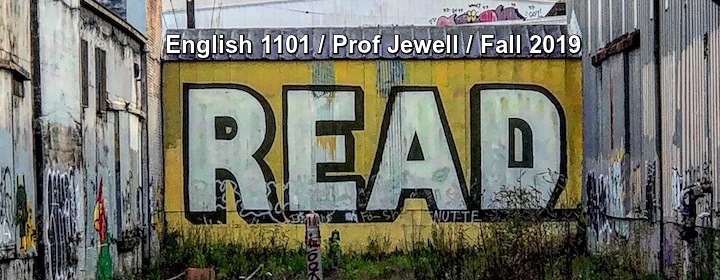Jevon Williams
ENG 1101
Navigating Writing
Throughout my early education, my literacy classes always had inspired me. However, I grew up not reading many books, newspapers, or articles. I believe reading is one of the most important aspects of education. Students that can’t read effectively fail to grasp important concepts. As an adult, I’ve acquired reading and writing skills that allow me to seek out information.
In a way, reading was and, still is, an integral part of my life. My mother would always press my younger sibling and I about the importance of reading more often. I never read a lot during my childhood and, even now, I don’t read many books or newspaper. The first time I realized how interesting writing was in the 4th grade. My teacher, every marking period, would make us choose a book to read from the class’s reading bookshelf. At the end of the marking period, we would have to write about it and a creative story to go along with it.
On its surface, Mark Twain’s the Adventures of Huckleberry Finn is a straightforward story about a boy and a runaway slave floating down the Mississippi River. But underneath, the book—which was published in the U.S. on February 18, 1885—is a subversive confrontation of slavery and racism. Huck, who grows up in the South before the Civil War, not only accepts slavery, but believes that helping Jim run away is a sin. The moral climax of the novel is when Huck debates whether to send Jim’s owner a letter detailing Jim’s whereabouts. Finally, Huck says, “All right, then, I’ll go to hell,” and tears the letter up.
After I chose the book I was going to read, the teacher handed out little “receipts” to everyone, so that when the marking period ended, the books we returned would be recognized as original by her. When school ended, I took the book home and read 4-5 pages a week. In the beginning, I had no idea what I was getting into. Before reading huckleberry finn, I’d often read short stories and little articles in the newspaper whenever I felt like it. This book marked the start of my fascination with writing.
I wasn’t a scholar of English or literature, but even I could tell, just from the first few pages I read that this book was well written. It wasn’t easy trying to read unfamiliar words, sentence structures, and more while simultaneously writing. As I struggled to read this in different environments, I began to get distracted, so I just started writing whatever stuck in my head on paper. My job was to only write a 1-page report on the book, so I just focused on key points and major details. I had no intention of reading the entire book, so this was a win for me.
After my job was accomplished, I put my report in a folder until the marking period was over. I spent 3 months on the report, leaving only the creative story to do. The creative story was optional and was more of a free write to help us develop our writing skills. I didn’t realize it at first, but there was more to reading than just reading. You are reading to learn about writing.
When I returned to school, I compared my report with those who also had finished early. Some of the other students’ reports were 2 -4 pages long. I was kind of confused about it, so I just assumed they had more to read than I did. Then they explained to me that they read more so they wrote more. I decided to read more about HuckleBerry Finn, and eventually finished the book. I revised my report and did a creative story to go with it. A week before the marking period ended, everyone submitted their reports and returned their books to the bookshelf. When the marking period did end, all our reports were graded, and I got the 5th highest score in the class.



